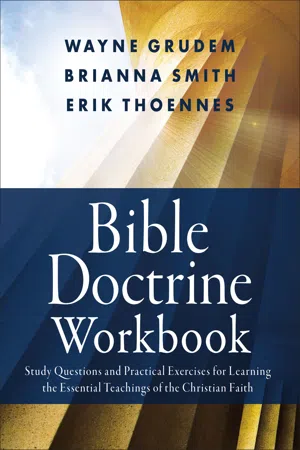
Bible Doctrine Workbook
Study Questions and Practical Exercises for Learning the Essential Teachings of the Christian Faith
- 224 pages
- English
- ePUB (mobile friendly)
- Available on iOS & Android
Bible Doctrine Workbook
Study Questions and Practical Exercises for Learning the Essential Teachings of the Christian Faith
About This Book
Deepen Your Comprehension of Life's Most Important Theological Questions.
How do we know the Bible is God's Word? What is sin and where did it come from? How is Jesus fully God and fully man? What are spiritual gifts? When and how will Christ return? If you've asked questions like these, then systematic theology is no abstract term. It's an approach to finding answers every Christian needs to know.
The Bible Doctrine Workbook accompanies Wayne Grudem's highly regarded Bible Doctrine, Second Edition. Following the textbook's structure, the Workbook features review material and exercises for every chapter, and all major areas of Christian doctrine are covered, including the Word of God, Humanity, the Holy Spirit, the Church, and the Future.
Sections in each workbook chapter include:
- Opening Prayer: oriented around the content of the chapter to help prepare reader's hearts as they get ready to study and reflect.
- Chapter Review: questions to help the reader identify and interact with key concepts.
- Thinking Critically: questions for readers to consider on how the content should influence their beliefs and actions.
- Personal Engagement: practical application questions that connect theology to daily life.
The Workbook maintains the clear writing, friendly tone, and frequent applications to life found in the textbook. Students will benefit from this hands-on engagement with the important teachings in Bible Doctrine.
Frequently asked questions
Information
CHAPTER 1
Introduction to Systematic Theology
OPENING PRAYER
CHAPTER REVIEW
| What does the Bible teach about prayer?
How does the teaching regarding prayer develop in the Bible?
What does Paul teach about prayer?
What do the Psalms teach about prayer?
How did fourth century Christians pray? |
Biblical theology
Old Testament theology
Historical theology
New Testament theology
Systematic theology |
BIBLICAL ENGAGEMENT
PERSONAL APPLICATION
PART 1
The Doctrine
of the Word of God
CHAPTER 2
The Authority and Inerrancy of the Bible
OPENING PRAYER
CHAPTER REVIEW
Table of contents
- Cover Page
- Title Page
- Copyright Page
- Ebook Instructions
- Contents
- A Note to the Reader
- 1. Introduction to Systematic Theology
- Part 1: The Doctrine of the Word of God
- Part 2: The Doctrine of God
- Part 3: The Doctrine of Man
- Part 4: The Doctrine of Christ
- Part 5: The Doctrine of the Application of Redemption
- Part 6: The Doctrine of the Church
- Part 7: The Doctrine of the Future